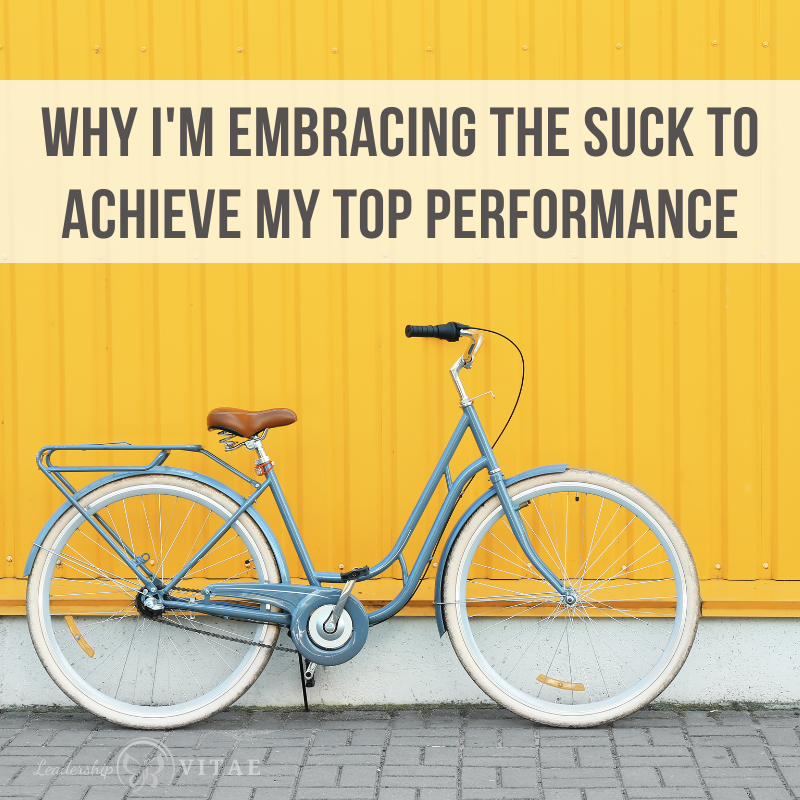
You know that expression, “Just like riding a bike”? It’s supposed to imply that even if we have been away from something for a while, it comes back to us naturally.
As someone who was away from bicycles for a while and then REALLY got back into them, that expression is misleading. Something can feel familiar and still be uncomfortable. Our speed back to proficiency may be shorter, but – depending on how long we were away – we still have to be willing to experience the suck.
I remember when I decided to get into long distance cycling. I cycled as a kid and talked about getting back into it as an adult. Many times. Friends would do charity fun rides and I’d think – that’s something I could do. Nope. I ended up their sherpa instead, carting their stuff to wherever the finish line was.
It wasn’t until after a major health issue that I decided to get back on the bike. I had ridden a few times in the intervening decades, and it did feel “just like riding a bike.” Until it was time to get on the road with cars. Don’t get me started on clip-in pedals or using a water bottle while flying down the road. Ack.
If we are okay being an amateur and playing it safe, then stepping away and coming back will likely feel easy. Obtaining or regaining true expertise? We’ve got to be willing to be an amateur again. To embrace the suck.
Accepting the suck
The suck can show up in many ways. Generally, you know you’re in it when familiar stuff feels hard. Something that once came easily now requires work to get to done.
Writing is like that for me. I’ve been writing since I was very young. About 15 years ago, I started writing consistently about leadership and books and blogs followed. It felt easy for those early months until I started setting goals to get better. Upping my game, so to speak.
Consistency helped. So did training. Challenging myself to pack a punch in 250 words or create a compelling framework and visual to go along with whatever I was writing about.
Then I took a 3-year hiatus. I got “off the bike” and had a hard time getting back on. Ideas weren’t there to inspire/motivate me to get going again. Finally, someone asked me to start writing as part of my job and I had a reason to start. To embrace the suck.
I love writing, when I’m in the flow. When I stop writing consistently, it means I have to be willing to struggle for a while to get back into it. For writing to feel like work, the words not to come, and to write anyway.
That’s the suck.
It’s not until I’ve written poorly, but consistently, that ideas start flowing again. That it feels effortless and “just like riding a bike.” We must be willing to be wobbly, fall down, and get back up again before our riding is smooth.
Be willing to suck to get better
Each time we want to improve our performance, we’re likely going to wobble again. It’s another level of the suck that signals we’re leveling up.
I took (fell into) another hiatus from writing over the last year. Once I recognized I was in burnout, I knew it was time to get going again. I also knew I’d have to get through the suck before writing would feel like the wonderful coping mechanism it is.
These first few articles are probably not as polished as they could be. I’m posting them anyway. Some of them are painfully long. Again, posting them anyway. To get back to the ease I had previously, I must be willing to suck first and then suck again to continue improving my performance.
I’m planning to start a master’s certification for leading and creating change in the coming weeks. The thing that’s held me back from a doctorate is the scholarly writing. My existing degrees in tech didn’t require I write in APA. No one is evaluating my articles for citations or giving me grief about punctuation, as I write how I think and talk. My posts, my rules.
I’m going through this program to push myself in a new direction with my writing. To get more comfortable with cited writing and see how I feel about moving forward with my doctorate. Maybe finish the book I have waiting on the shelf. Written, but not in a way that I think it should be with cited research.
Embrace the suck
Fear of the suck has held me back long enough. We’ve got to embrace the hard – even on things we feel naturally good at – to achieve to our best performance level.
How often do we avoid something new and inspiring because we’re unwilling to fail forward? That’s right…fail FORWARD. Making mistakes or being less than awesome are requirements for getting to average. LOTS of mistakes are needed to get to good or great.
Even if we do try, how often do we stop at average because it feels comfortable? There are all sorts of studies that a majority of us thing we are better than average at just about anything. By definition, most can’t be better than average.
We must be willing to be less than average before we can get to mediocre, let alone good. Be willing to be wobbly and fall at each level up to good and then great.
I have to regularly remind myself the suck isn’t something to fear. I love writing and my style. It feels conversational and approachable (and comfortable). I can tell myself all sorts of reasons why I shouldn’t mess with that and bother with scholarly writing. And yet.
I’m a life-long learner and some of the spaces I want to learn in will require that kind of writing. The safe space I’ve created for myself is great, if I want to stay here and top out at average (or less than average as the bar keeps moving).
We each get to decide if fear of the suck is greater than our dreams. Than our possibilities. Remind me I said that when class starts. Let the suck begin.








